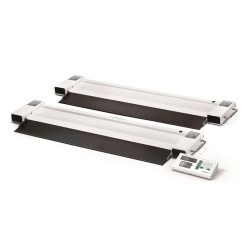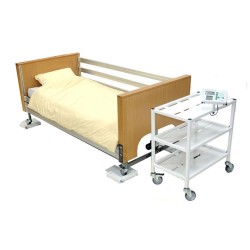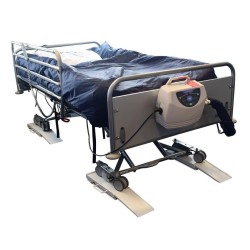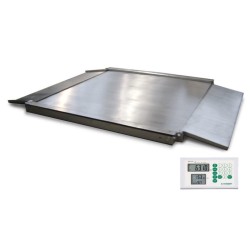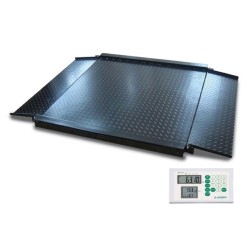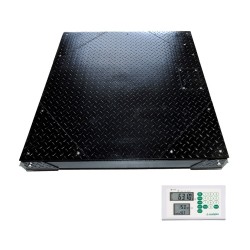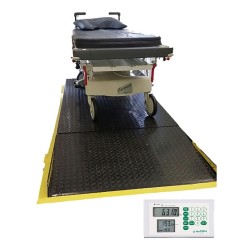Medical Bed Scales
There are 7 products.
Active filters
About Medical Bed Scales
Safe Patient Weighing Without Transfers or Movement
Medical bed scales provide essential weighing capabilities for patients who cannot be safely transferred to conventional weighing equipment, serving intensive care units, high dependency areas, hospices, and care facilities throughout England, Scotland, Wales, and Northern Ireland. These specialised weighing systems enable accurate weight measurement whilst patients remain in bed, utilising weighing mechanisms integrated into bed structures or portable systems placed under existing beds. Healthcare environments rely on bed scales for weighing critically ill patients requiring continuous monitoring, immobile patients for whom transfers pose risks, palliative care patients requiring minimal disturbance, bariatric patients exceeding conventional scale capacities, and intensive care patients connected to life-support equipment preventing transfers. Modern medical bed scales incorporate features including high accuracy despite challenging measurement environments, tare functions compensating for bed equipment weight, data connectivity integrating weights into electronic records, and various designs accommodating different bed types. The availability of bed weighing capability ensures inclusive weight monitoring across all patient populations, prevents safety risks associated with unnecessary patient transfers, and supports evidence-based care through reliable weight data for vulnerable patients across professional healthcare environments.
The implementation of medical bed scales directly supports CQC compliance through patient safety enhancement, accessible clinical care for all patients, and demonstration of appropriate equipment provision meeting complex care needs. Critically ill or immobile patients traditionally face two inadequate options: transfers to conventional scales risking patient deterioration and safety incidents, or absence of weight monitoring compromising clinical care through missing crucial data. Medical bed scales address this dilemma by enabling safe in-bed weighing eliminating transfer risks, providing accurate weight data supporting clinical decisions, delivering dignified care through minimal patient disturbance, and enabling frequent monitoring detecting early changes. Clinical applications include intensive care weight tracking detecting fluid retention or losses, renal care monitoring supporting dialysis management, cardiac care weight surveillance detecting heart failure exacerbations, critical care nutritional assessment guiding feeding interventions, and palliative care monitoring without disturbing dying patients. Healthcare organisations benefit from reduced transfer-related incidents when bed scales eliminate unnecessary movement, improved clinical outcomes through better monitoring enabling timely interventions, and enhanced efficiency through quick weighing without complex transfer procedures. Modern bed scales incorporate advanced features including automatic tare calculations, multiple measurement modes, and alarm integration throughout England, Scotland, Wales, and Northern Ireland.
Selecting and implementing medical bed scales requires assessment of patient populations, appropriate system specification, and integration with clinical protocols across healthcare facilities throughout the UK. Organisations should evaluate the volume of patients requiring bed weighing, determining whether portable systems serving multiple areas prove more cost-effective than beds with integrated scales, assess clinical requirements identifying necessary accuracy levels and features, and consider practical factors including compatibility with existing bed infrastructure and staff training requirements. Equipment selection should prioritise medical device certified systems meeting accuracy standards, appropriate capacity accommodating bariatric patients, compatibility with various bed types particularly for portable systems, and user-friendly operation minimising disruption to patient care. Implementation protocols must encompass comprehensive staff training on system operation including proper sensor placement for portable systems, tare procedures accounting for bed equipment, troubleshooting common issues, and appropriate use indications. Quality assurance measures should include regular calibration maintaining accuracy typically annually, validation checks before critical measurements, cleaning protocols particularly for portable systems used across multiple patients, and monitoring of weighing-related incidents. Modern bed scales incorporate features such as wireless connectivity eliminating trailing cables around beds, battery operation enabling use during power failures critical in intensive care, and integration with bed monitoring systems. Organisations should establish clinical protocols identifying which patients require bed weighing, determine appropriate weighing frequencies balancing clinical needs against operational considerations, and integrate weights into care pathways triggering interventions for concerning changes. Clinical teams should consider specific patient groups including trauma patients with spinal precautions, burns patients requiring minimal disturbance, and unconscious patients unable to cooperate with transfers. Documentation systems should demonstrate appropriate equipment use and maintenance. By implementing medical bed scales and professional weighing protocols, healthcare organisations throughout England, Scotland, Wales, and Northern Ireland demonstrate their commitment to CQC standards, patient safety through elimination of risky transfers, inclusive care enabling monitoring for all patients, and provision of sophisticated equipment supporting optimal outcomes for complex, vulnerable patients requiring intensive monitoring without the risks and distress of conventional weighing approaches.

